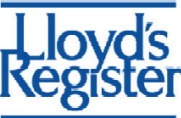Neda Maritime Achieves ISO 50001 Certification
Neda Maritime achieves ISO 50001 certification to join an elite group of tanker owners who are managing their energy use more effectively. After months of close work with Lloyd’s Register, Greek shipowner gains international standard.
The Piraeus-based Neda Maritime Agency Co. Ltd has joined an elite group of ship operators who have certified their systems and processes against the ISO 50001 standard, demonstrating the employment of best practice for efficient energy use and conservation throughout their fleet.
Neda had previously achieved certification against a number of internationally recognised HSQE standards, among them ISO 9001 and ISO 14001, for their quality and environmental management systems. “We are pleased the ISO 50001 certification further recognises that our best practices for energy use and conservation have been fully integrated into Neda’s fleet of vessels,” said Neda's Technical Director, Costas Mitropoulos.
The ISO 50001 standard is a global energy-management system developed by the Geneva-based International Organization for Standardization that helps companies to continually improve their performances with regard to energy efficiency, use and conservation. It also provides shipping companies with a way to actively reduce their energy consumption and associated GHG emissions from ships.
The standard presents a comprehensive and clear approach to smart energy use, providing companies with a framework to manage their energy consumption and, ultimately, to take advantage of renewable energy technologies.
“Leading owners are smart to monitor their energy management and the ISO 50001 standard provides an excellent pathway to a more effective performance,” said Efthymios Louridas, Marine Business Development Manager for Lloyd’s Register’s Piraeus office. “We congratulate Neda for seizing the initiative.”
The certification covers the two high specification VLCCs delivered to Neda this year from Daiwoo Shipbuilding & Marine Engineering in Korea. The MT Aragona and the MT Aquila oil tankers include the latest environmentally friendly technologies to reduce emissions and enhance structural integrity.
The vessels’ inert gas system has been fitted with the ‘Vocon Press-Vac’ system to control cargo vapours while laden and in passage. This system has two main benefits: it reduces harmful emissions and increases the landed cargo – potentially adding value to Neda’s charterers. Additional equipment on the ships will reduce turbulence during cargo transfer, increasing loading rates and reducing turnaround time in port, providing further in-service benefits.
At the same time, the two VLCCs have been built to a robust design drawn from extensive studies and experience in double-hulled LNG carrier design with respect to the hull structure and understanding of the cargo-sloshing resonance that can lead to structural failures and increased vapour loss.
Both vessels are powered by a MAN Diesel & Turbo tier II-compliant engines fitted with cylinder cut-out and turbocharger cut-off systems, supporting slow and super-slow steaming. Other measures to reduce fuel consumption include propeller-efficiency technology, PSS (pre- swirl stator), Propeller Boss Cap Fins and a copolymer-based coating never used before on the hull of a VLCC.
The tankers can super-slow steam using about 25% of available power, at up to 12 knots, on a daily fuel oil consumption of about 30 tonnes.












